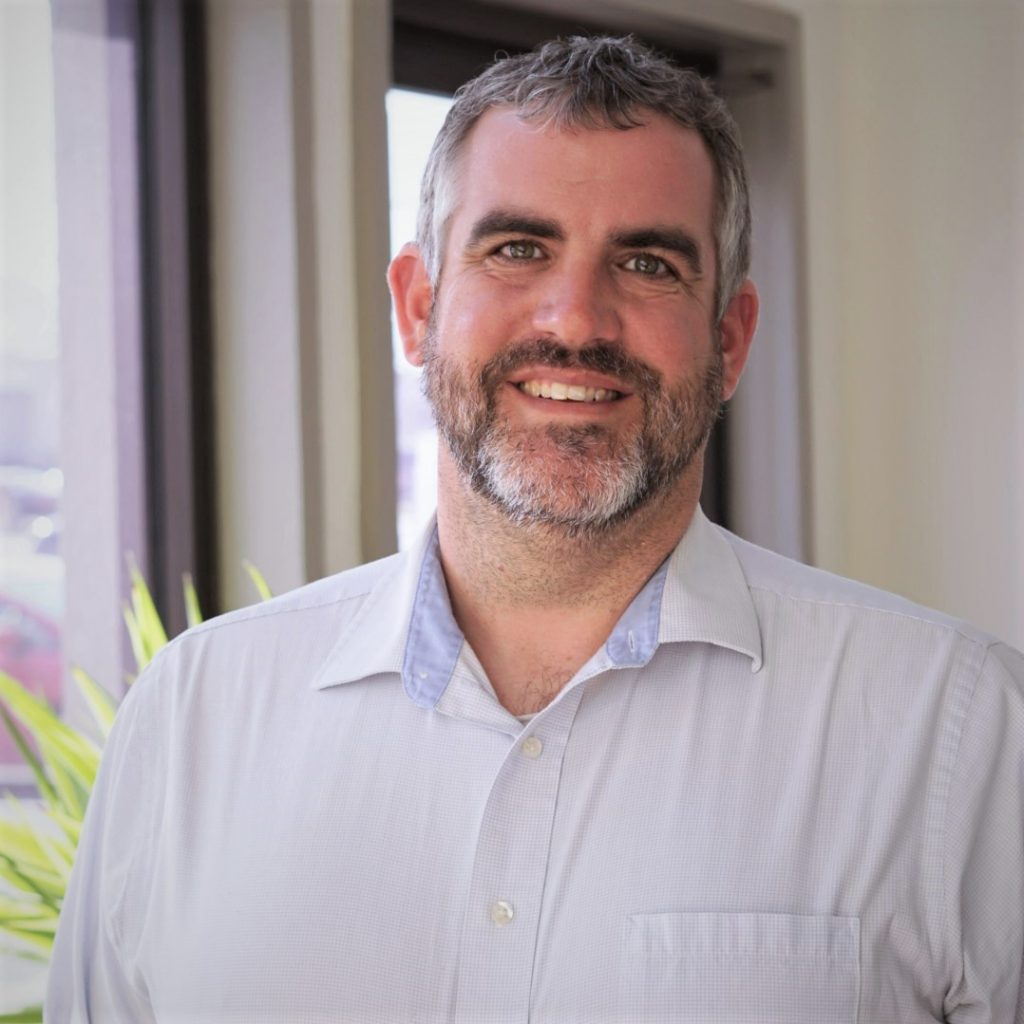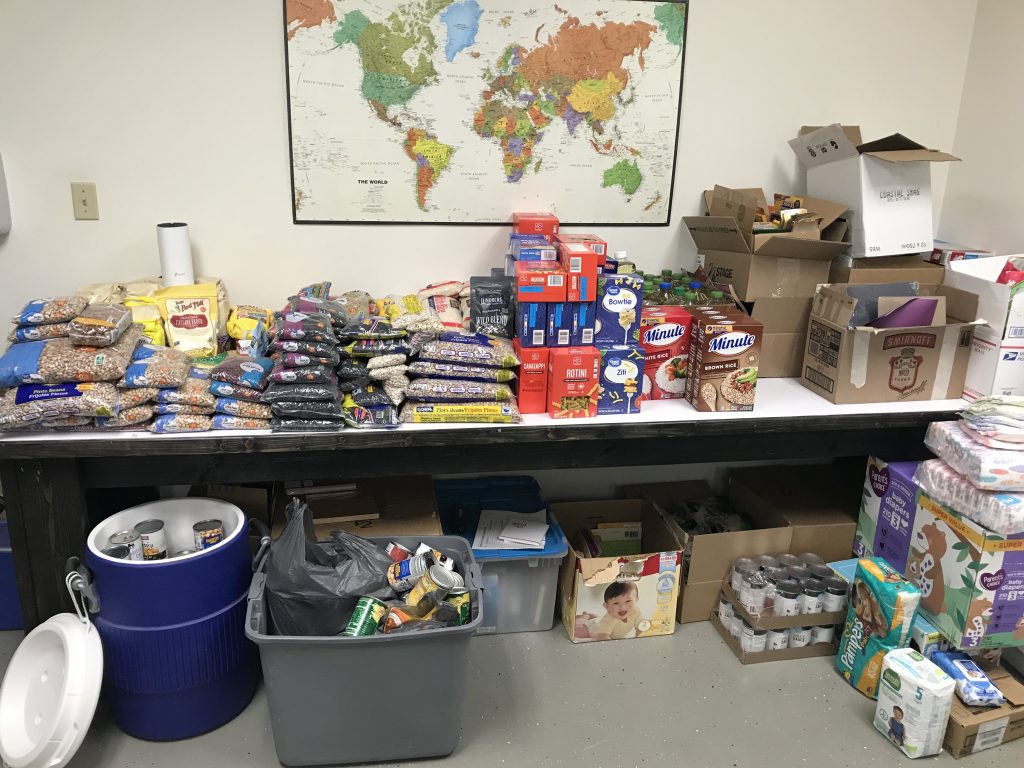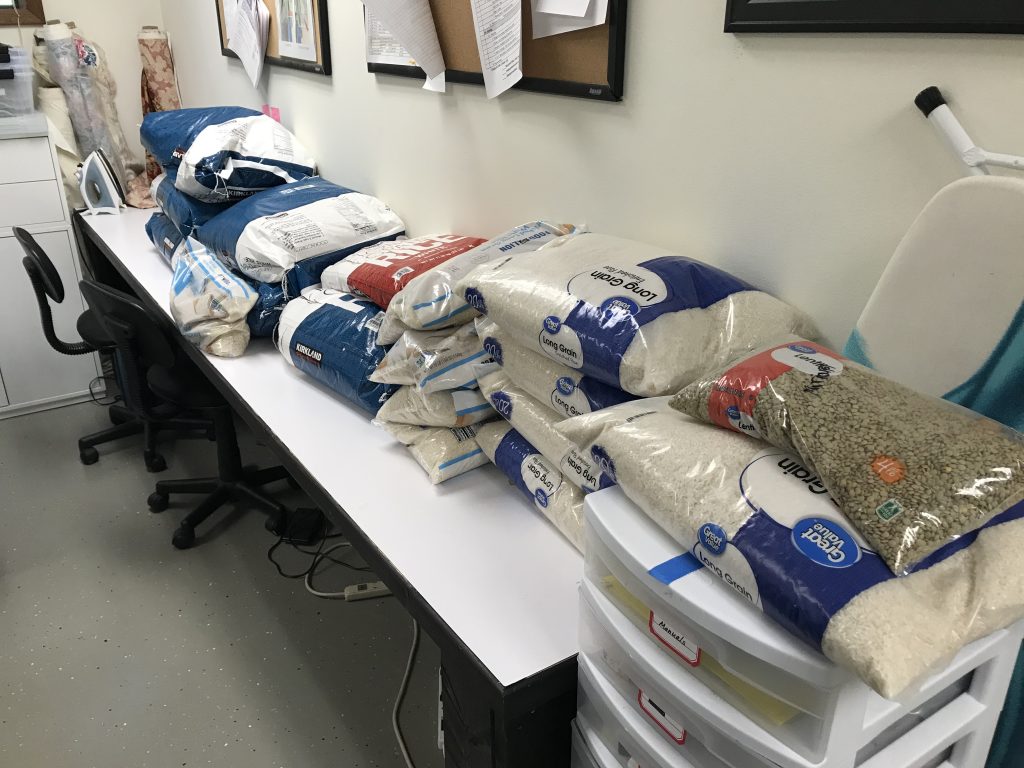Blog
Family Amidst Tragedy – how one Good Neighbor Team is providing hospitality and hope.
It’s been eight months since the fall of Kabul. World Relief North Texas welcomed many Afghans with the help of volunteer Good Neighbor Teams. Read about their mutual transformation as they recount their shared stories with us.
Susan has been attending Arlington Chinese Church for 6 years now. She is a part of a young professional’s community group there, where she has been able to develop an amazing community and grow in her relationship with Christ. Her parents were immigrants to the U.S. when she was just 3 years old. After moving from China to Texas, Susan worked hard alongside her parents to integrate to life in the U.S. During Susan’s 4 years of medical school in Fort Worth, she lived in nearby apartments where many refugees had been resettled by World Relief.
Her next introduction to the needs of new families was through her clinic, where many of them came in for their very first appointment with a doctor in the U.S. Through a desire to serve the most vulnerable and to understand her patients better, she explored volunteer opportunities with World Relief. She encouraged members of her small group to get involved by volunteering for a one-day event at a soccer game.
From this one event, her small group realized a need and wanted to know how to become more involved. As they prayed, they decided to serve as a Good Neighbor Team, a group of 8-12 people who commit to serve and walk with an arriving refugee family for the first 6 months in the U.S. As they prepared to become a Good Neighbor Team, the Afghan crisis happened and Kabul fell to the Taliban. Susan recalled that “the Lord timed it really well and we were able to take an Afghan family right as they came to the US.”
Asadullah and Sahar
Asadullah and Sahar lived a normal life in Afghanistan. Asadullah worked for the U.S. Government as a translator, and Sahar taught at an elementary school until she had two kids of her own who are now 2 and 4 years old, with a third child on the way. Asadullah mentioned that in the midst of this normal life, there were still hints of violence and danger throughout Afghanistan. Things such as target killings of those who were helping the U.S. or international organizations. Tragically, this included the assassination of Sahar’s father.
The Taliban’s invasion of their home displaced Asadullah and Sahar, along with over 700,000 other Afghan peoples who were evacuated from Kabul. Asadullah remembers receiving an email from his company that the Taliban had invaded and he needed to leave immediately. He rushed to get his wife and two children where they walked and waited in the Kabul airport all night long.
From here, they went on a long journey to arrive at a camp in El Paso, where they remained for two months. Then they were sent to Fort Worth, Texas where they were resettled by World Relief.
North Texas
When they arrived in Fort Worth, Asadullah says that they were excited because “we had a home and a kitchen, and World Relief continually helped us.” Susan recalled that they first met them in their AirBnB because their apartment was not ready yet. One of the first things that was said by Asadullah was “we are so happy to meet people that look like us.” (They are ethnically Hazara which descends from Mongolians and they will look more East Asian and less Arab or Persian.) Asadullah and Sahar shared with their Good Neighbor Team, “it is not just a coincidence that we were paired with you.” Susan shares that they are so sweet, the family was eager to get involved, settle down, and get their kids enrolled in school. It was a thrilling experience for the Good Neighbor Team to help them enroll their children in school and help them become integrated into society.
What impacted Asadullah and Sahar most upon their arrival in Fort Worth, was their Good Neighbor Team. Their Good Neighbor Team were the first people to meet them, help them move into their apartment, and take them grocery shopping. Asadullah and Sahar did not have any form of transportation or any knowledge of the metroplex, and are thankful that they had a Good Neighbor Team to show them these things. Their new friends took them grocery shopping, bought clothes for their children, and took them to picnics at the park.
After several months of spending time with his Good Neighbor Team, Asadullah reflected: “One time I invited the Good Neighbor Team over. We were all sitting around the kitchen table and I thought, ‘this is my family.’”
The impact surpassed any barrier of culture. Asadullah mentioned, “any time I faced a problem or didn’t know what to do, they were who I called. Without them, I’m sure I would have faced many problems.”
Family Amidst Tragedy
Sahar tragically had a miscarriage shortly after arriving to North Texas. Sahar mentioned how scary it was losing a child in a new place with no family. When she miscarried, they immediately turned to their Good Neighbor Team for help to navigate such a tragic situation. Susan was able to get Sahar to the hospital, and helped them navigate surgery, recovery, and medical bills. She still experiences deep sorrow over this loss, but the Lord used this circumstance to show Asadullah and Sahar that they are never alone, even during the most tragic times.
“Our Good Neighbor Team behaved like a family and encouraged us to not be disappointed about uprooting our lives.”
The Impact
As a huge impact was being made on the lives of Asadullah and Sahar, another impact was being made in the hearts of their Good Neighbor Team.
Susan mentions being impacted by the hospitality that Asadullah and Sahar showed them. She recalls being at their apartment with the whole team when they hardly had any furniture, and Sahar served them all tea and food, and gave whatever she did have to host them. Susan was deeply marked by being served by someone who hardly had anything.
We asked Susan what made the biggest impact on her in getting to serve Asadullah and Sahar, and she shared with us through tears, “seeing them has helped me to understand my parents’ journey to the U.S. as immigrants with nothing but a few hundred dollars.” Watching Asadullah and Sahar learning how to adjust their entire lives, and wanting to provide in the best way for their children has helped her understand what her own parents went through. “I never understood the sacrifices my parents had to make for certain things until I saw Asadullah and Sahar’s journey.”
Another amazing part of Susan’s parents’ story she shared was “my parents had an older couple who welcomed them from the airport and cared for them for the first 1-2 years of them being in the U.S. They helped my parents adjust and adapt because my parents spoke no English at first.” Susan, as well as the rest of the Good Neighbor Team, was able to love this family even more because they found unique ways they related to Asadullah and Sahar. “It’s been very rewarding to see how God uses each person on our Team because we all have different backgrounds and skill sets. God has allowed each of us to come alongside the family in different ways which is so sweet to see that this is how the body of Christ is.” Ultimately, she shared, “the impact on me has been the kindness shown in hospitality, the ability to relate from my own journey, and to see how the body of Christ can function using their different gifts.”
“They are very open about what they believe in, but also are very open to hearing about our faith, and I don’t believe any of those conversations could happen if it was not for the amount of time spent building a relationship.”
A New Home
Asadullah and Sahar say that they are happy they are here and that they are safe. They are thrilled that their daughters will have a great education and have an opportunity for a good life. Sahar said that she will never forget the first time she saw her good neighbor team because “I was so happy” she said as she beamed with joy even telling me about it. “It was very special. We felt like a family because our faces are the same as their faces. They are my family.” Right now, they are excited to attend Susan’s wedding. It will be their first American Wedding.
“The goal from the beginning was for them to see Jesus by becoming their friend.”
They have now been in the U.S. for 8 months, and in those 8 months, the Lord has provided them and their Good Neighbor Team with family, community, and the love of Christ.
If you have been inspired to serve with World Relief North Texas as part of a Good Neighbor Team, there are next steps for you! Fill out a volunteer application below.
Learn how you can become part of a Good Neighbor Team with World Relief North Texas HERE.
Confronting our Comfort Zones: Q&A with Victor Wallace
By Nathan Spencer // Sometimes, God pulls his servants in directions they are not expecting, often without warning. In these moments, God insists we put aside our fears and lean on our faith in him to direct our steps.
After his home church made the difficult decision to dissolve, Victor Wallace and his wife felt called to a new church that would push them to serve their community — an area Victor felt his former church failed to focus on. Though they did not know which church would become their new home, this mission and call to serve others was unquestionably on their hearts.
“I believe God ended that church for our benefit and his glory,” Victor said. “In 2008, we arrived at Summit, and through people there who were already connected, we heard about World Relief. We had no prior engagement with refugees before asking to become volunteers, but we took on that responsibility and owned it.”
Quickly after becoming Friendship Partners with World Relief, Victor felt the weight on his heart pulling him lift away. This was the mission he and his family were called to take part in.
“Right away, we were partnered with our first refugee family, the Tamangs, in October 2010,” Victor said. “We are still friends to the day. A few weeks ago, their son emailed me, and we had a video chat just talking about life.”
Victor continues his mission in all walks of his life. At his business, he currently employs five refugees on his staff and is looking to hire more in the next few months. He has also assumed the lead World Relief volunteer role at the Summit Church in Durham, NC where he shares his story and encourages more members to act on God’s call to serve.
Read the rest of our interview with Victor to learn more about his journey with World Relief and his passion for service.
Do you have a favorite story from your partnership with World Relief?
What immediately comes to mind is a special moment with the Tamang family. The mom, dad and youngest son came to America first. The oldest, Vijay, arrived over a year later in 2011 with his wife. They had a baby a year or two afterward, and they gave us the honor of naming their child. We called her Grace Tamang. That was a mind-blowing experience for us and illustrated just how important our friendship with the Tamangs was both to them and us.
Another story that comes to mind is about a refugee who came to stay with us at our home for a couple of weeks. He was a Buddhist monk. I casually invited him to Summit, and he was vehemently opposed. We were okay with that and didn’t push. Eventually, he moved and settled elsewhere, but we continued to visit him.
His wife at the time spoke no English, but she met some other Vietnamese immigrants who worked at a hotel and got her job. One night, my wife and I went to visit them in their home. I had been trying to figure out how to engage with the man about the gospel. He was opposed to talking about it, and I didn’t want to push. So, I bought a pop-up book as I felt it was the most accessible thing I could get.
That night I brought the pop-up book to give it to him, and I noticed he had a Bible on his table, and he had a shirt with John 3:16 written on it embroidered on the shirt. I made a joke in my ignorance, “Oh, the irony. You don’t even know what you’re wearing, right?” This sparked a conversation.
He told me, “Well, my wife met these people and invited me to church with them. I received the gospel, and now I’m a born-again Christian. We are brothers.”
The women his wife worked with were Christians preaching the gospel through their work. Their pastor lives in Greensboro, so they drive from Durham to Greensboro to go to church.
I looked down at my little pop-up book and laughed, “Well, here’s a gift for you, anyway.”
It was so encouraging for me to be a witness to how God is active and sovereign in all things.
How have you experienced personal transformation?
You’re not going to engage anybody different from you unless you get out of your homogenous neighborhood. I’m not saying living there is terrible, but unless you do something very intentional, you will never engage people who are different than yourself. It was a significant change to move neighborhoods, but it is something we do not regret in the slightest.
It took many nights of prayer, but my wife and I have been blessed by the Lord laying this challenge on us. You make your plans, but God directs steps ultimately.
Beyond being a volunteer, we have committed to employing refugees at our business – a car wash and detail service – since 2010. Currently, we have five Sudanese people working there, and we’re looking to hire more as well. Typically, we have three to seven refugees working with us at one time. Currently, my wife and I are partnered with Sami Ali, who lived in Sudan, as Friendship Partners.
What is your hope or vision for your community or the world, and how is your partnership with World Relief leading you towards that vision?
God changes us over time as we engage with his word and light. Ezekiel and Isaiah look up and see God in this perfect light, and it changes them to serve. His light is not condemning; it’s life-giving. That should be a pattern for all believers. If you’ve genuinely seen God, you should be changed to want to serve others. Offering ourselves as a living sacrifice hurts, but we can get over that.
From Volunteers to Friends through Welcome
Volunteers Nancy Montgomery and Peter Jennings share their journeys as active World Relief Triad partners working to build relationships with Afghan immigrants through producing a message of holistic, sustainable change and welcome to their community.
The Journey to Volunteering
For Good Neighbor Team members Nancy Montgomery and Peter Jennings, they can trace their desire to serve refugees and immigrants to before their time at World Relief. Nancy says that her first experience was working with Syrian refugees in Athens, Greece in 2017. “That was my first experience with any type of work with refugees,” she says. From there, her curiosity was sparked when she came back home. “ I had already done the training a few years ago, so I signed up willingly to welcome a new Afghan couple in 2021,” Nancy says. By February 2022, Nancy’s “Good Neighbor Team” of St. Paul’s Episcopal Church had their first dinner meeting with their new friends: the Rahmani’s.
Peter Jennings’ journey dates back a little further than Nancy’s. Born into an American family living in Germany, Peter was able to see through his own parents how love and compassion can transcend cultures and nationalities. When his parents decided to show kindness to a begging woman by providing her a job and a place to stay, Peter used his witness of his parents’ generosity as motivation for serving others.
“The kindness that I saw in my parents to people that you wouldn’t expect–She was German, and we were friends with her right after the war!– That always followed me,” Peter says. “As I moved from country to country with my parents, so many different people welcomed us into their homes. I think we should do the same for refugees and immigrants here.” After Peter applied to partner with World Relief Triad through volunteering in 2016, he decided to reach back out in 2021. He was soon paired with a man who had recently arrived from Afghanistan by the name of Sultani Fraidon.
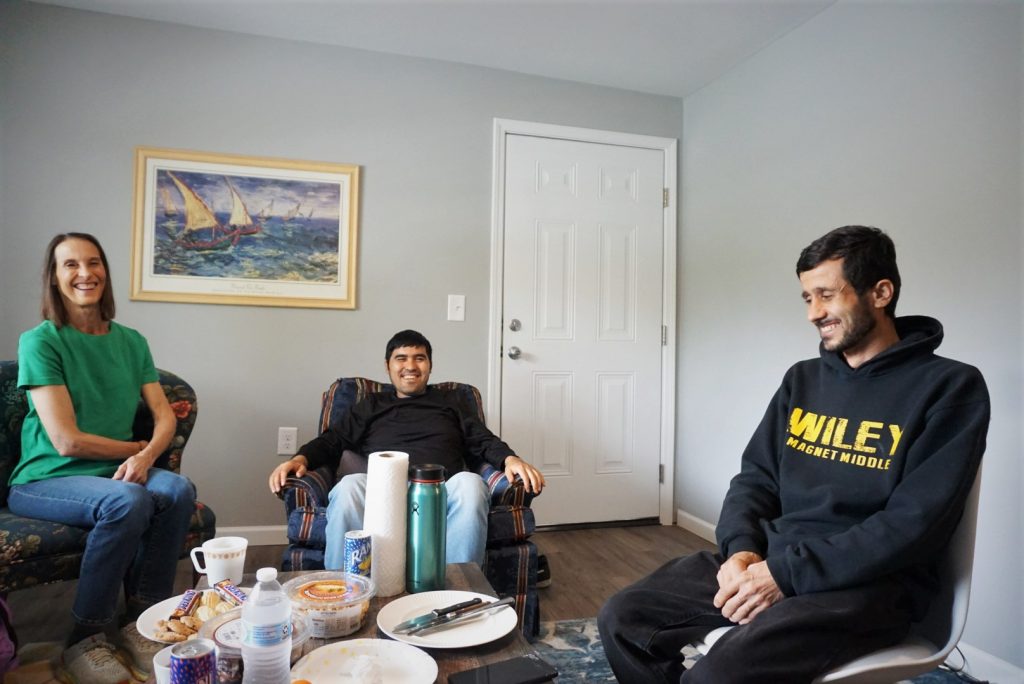
“Sultani didn’t speak any English, and I didn’t speak any Dari. I had an app that was in Persian, but he couldn’t read or understand Persian,” he says. Peter realized that if he wanted to communicate with his new friend, he would need to connect with one of Sultani’s friends who could help interpret. It just so happened that Ali Rahmani, who lived one floor above Sultani and had recently been connected with Nancy Montgomery, spoke both English and Dari.
Holistic Change & Integration
Both Peter and Nancy quickly point out their service to Sultani and the Rahmani’s as based in friendship.
“From the beginning, we’ve learned that it’s about relationships,” Nancy says. “They’re so gracious in always inviting us to stay, eat, and visit.” When asked what her favorite part about volunteering is, she states that losing track of time is one of her favorite parts.
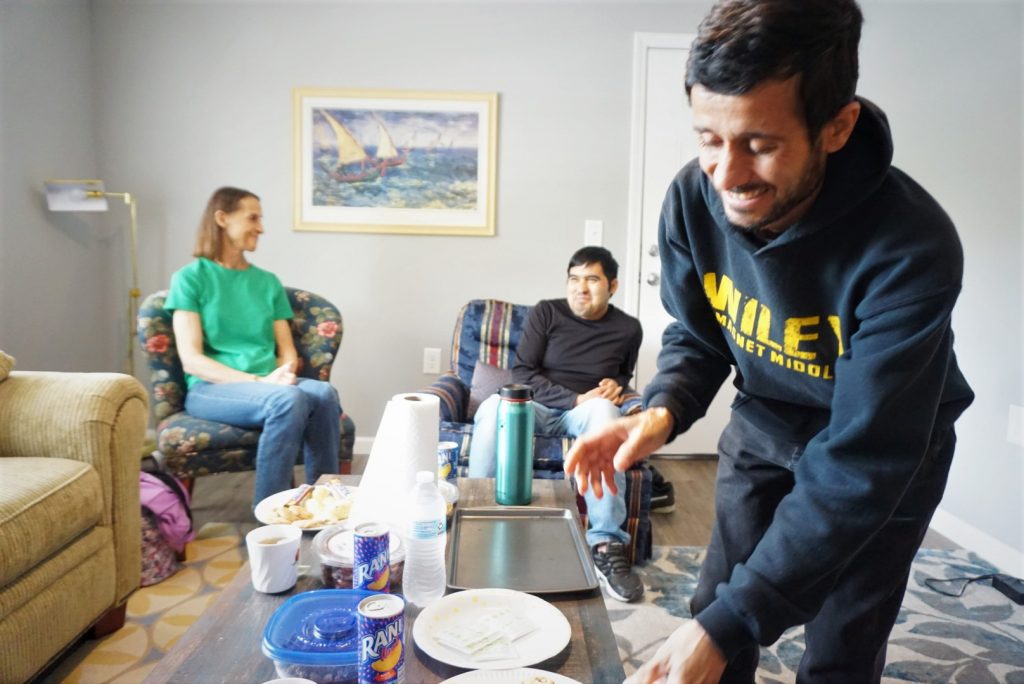
“Something that I think is going to take one hour may take closer to three or four,” she says. “When I’m with them, I want to be very present. I like the fact that I don’t know what’s going to happen. It’s taught me not to focus as much on my American obsession with my schedule.” There’s also an acknowledgment of the importance of asking lots of questions. The volunteer says that while her new friends ask a lot of questions, she also wants to ask them questions and learn about them. “We see how similar we are as human beings,” she says. She uses the example of talking to Ali’s wife about her daughter and what it’s like to be a mom as a common experience.
“We’ve learned overall, though, that it’s about relationships and not just ‘doing things’ for them,” Nancy states.
Nancy highlights hers, Peter’s, and the rest of the Good Neighbor Team’s focus on independence as a way they help bring their new friends sustainable integration. “Peter taught Sultani and Ali how to ride public transportation and acquired 30-day bus passes for both of them to use going to work and their ESL classes,” she says. “He is also already helping Ali complete the written exam for his driving test. We’re trying to think past the immediate need and focus on what it’s going to take long-term.”
The Community‘s Response as a Place of Welcome
Nancy believes that though the issue is very timely, people would still be moved to get involved. “I think people have an innate interest in serving people who come here at times with just the shirt on their backs.”
Peter can testify to that as he tells the story of how one message to his next-door neighbors on an app received over 194 responses. “I wanted to see if we could get a couple of TVs for these two Afghan families so that they could learn English,” he says. “With 194 responses and only one negative response, I was stunned.”
“Since I have been a volunteer for World Relief, I have met and learned of a lot of unselfish acts of kindness in this community.”
-Peter jennings, volunteer
But perhaps the most amazing moment of welcome from the community happened one day when a couple of the Good Neighbor Team members decided to take Sultani to a local restaurant in Winston-Salem for lunch. With Sultani being a cook, he was excited to hear about the potential job opportunity at the restaurant but was worried about his lack of English. But after the manager of the restaurant reassured him that it would not be a problem, the volunteers left with hope. When Peter returned to the restaurant with Ali’s wife and Sultani later, he had no idea that yet even more generosity and service were about to be provided to them.
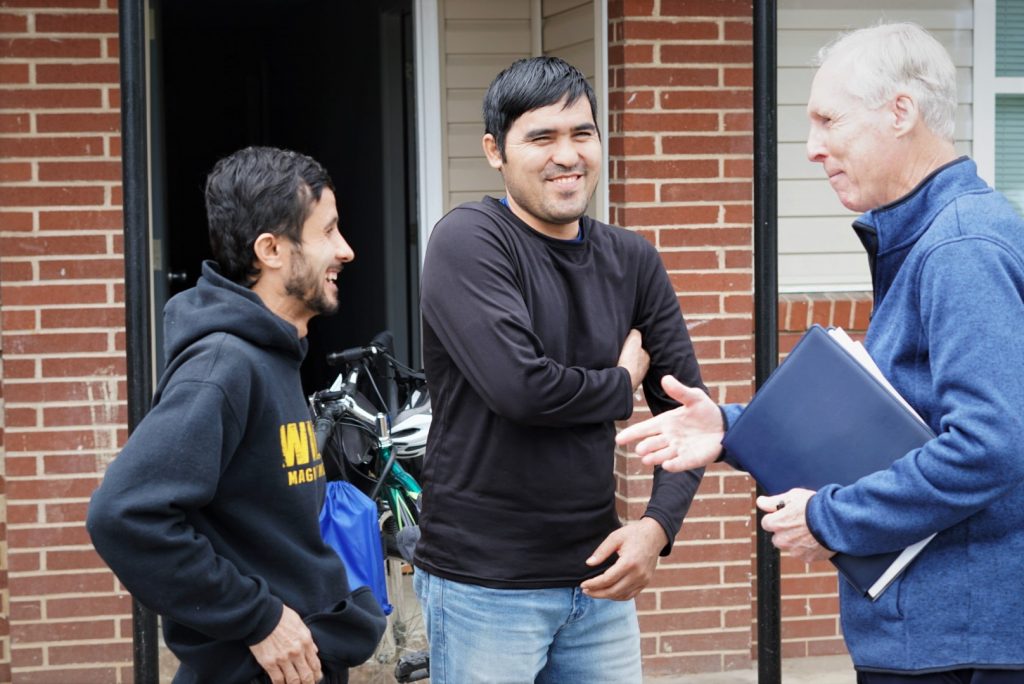
“After I helped Sultani fill out the application and we took it over to the restaurant, we met the owner, Ari Ziogas, who began to answer all of our questions and told us his job would include benefits,” Peter says. “Another day soon after that, I was there with Ali’s wife and Sultani again, and an older gentleman came over to give me a $100 bill to give to Ali’s wife.”
“It turns out it was Bob Ziogas, the father of Ari! He told us that, forty years ago he had a similar experience coming from Greece to the U.S.,” says Peter. “What a heartfelt story for him to tell about his life and really have an understanding of what these people are going through. To me, it completes the circle. I was thrilled to see that Sultani was hired, and then to have Ari’s father come out and give the money to Freshta was so encouraging.”
Peter and Nancy both express a desire to see Sultani, Ali, and their families thrive in the United States as the motivation for their service. By helping the community to see their new friends as highly-contributing members of their society and people who have stories and the potential to become close friends, they are bringing true change together.
“To see them getting stronger with every encounter is encouraging,” Nancy says. “The more comfortable they become with us and as the relationship grows, I just see that resilience growing. I think it’s giving them hope that they have friends and a community and they can do this.”
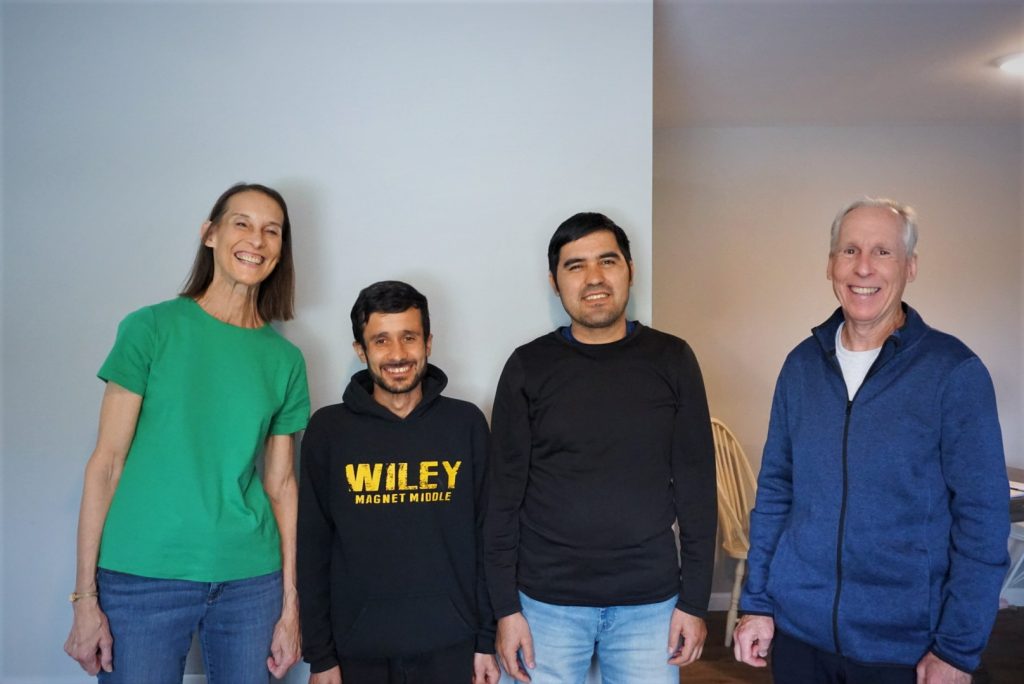
Want to help bring hope and change to the lives of immigrants? Click the button below to learn more about how you can volunteer with us.
Alexis Dubreuil: Intern Reflection
I’ve always considered it a blessing to have been raised in an environment that exposed me to different types of peoples and cultures. I am one of a lucky few to have this blessing; the potlucks at my churches always presented a beautiful array of food originating from the Middle East, Southeast Asia, the Caribbean, and South America. I prided myself in knowing that I was never truly a victim of culture-shocks—embracing and celebrating differences was natural— exciting, even.
Additionally, as a French major and an International Studies major with a political science emphasis, I have spent the past two and a half years delving deep into the histories, cultures, and current political environments of many different countries. I speak French and Spanish well enough to conversate. These are all things I was able to tell the Intern Coordinator at World Relief, a Christian based non-profit organization that works with helping refugees upon their entrance to America, that I believed both qualified me and made me excited for a position.
I became an intern at the Spokane location twice a week for 4-7 hours a shift under the lead Job Developer for refugees. Her job, as written, was to help connect refugees after they have settled in their first few weeks, to potential employers so that they can become self-sufficient. In my head, I imagined my job would be meeting with incoming refugees, interviewing and writing resumes with them, and connecting them directly with hiring jobs in the area. I was expecting to form relationships with the cases I worked with, and to utilize my cultural competency to navigate barriers in communication.
Scratch that.
The stress, confusion, and disarray that was the U.S. removal of troops from Afghanistan shifted my role completely. This fall, World Relief was pressed for donations, for volunteers, and with the creation of a new Afghan parolee system specifically for helping the extremely large influx of Afghan refugees, all hands were on deck. It was an extremely unique time to start working for the organization—no longer was my role to simply be writing resumes, but, as my director explained, I wore many hats.
On a day-to-day basis, I juggled many tasks: sometimes I was taking my clients to job interviews, sometimes taking them to doctor’s appointments, and sometimes picking their kids up from school, and sometimes doing all of that and then some in a single afternoon. I had to learn how to drive and park a ten-seater van during my time there so I could help drive big families. My supervisor was amazing, and believed in the relationships formed more than just the bare minimum of the job, and wanted the same for me. I met with clients, but I also went to their houses, I brought their kids toys, and I helped them move to different apartments.
Forming these relationships could not have been more rewarding. Although knowing Dari, Pashto, Vietnamese, or Swahili would have been much more useful than French, I was able to connect to Francophone clients in a way that my coworkers could not. I became close to one of my clients from Congo, a young mother with four kids. Getting to know her and her kids was a highlight of my internship; seeing how she cared for her kids and engaged with all of the resources World Relief had showed her ambition to build a new life. It is so obvious to me that refugees in America are driven and intelligent. It is beyond me how anyone could claim that refugees and migrants have nothing to contribute when they are the people that seize every opportunity to build this country up.
However much joy there can be with working with refugees, working with people exiled from their country also requires a lot of sensitivity. Sometimes clients would share, sometimes they would not—seeing refugees not just as people immigrating, but as people that have had their lives completely changed (for many, in a matter of days), calls for empathy from the staff.
A client walked in one morning to speak with my supervisor, and was telling me a bit about the Taliban activity in his village far from Kabul. He showed me pictures of hundreds of Afghans standing in a plane, packed like sardines to get to America. Afterward, he told me about his family that had to escape to Kabul where they would not be identified as being associated with him at all. This was because he drove trucks that transported goods to the US military as work. I was in charge of this individual’s entry interview, and I remember asking him, “You’ve been here for about a week, what do you like most about Spokane thus far?” He replied, “Me and my family are safe.”
While every refugee’s story is different, most of the refugees I spoke with had stories just as intense. They made me think hard on everything I take for granted in the US. While the United States has plenty of its own pressing problems and structural issues, I have never feared for my life in the way many of these individuals have; it was a very unique time of reflection for me.
Besides the work itself, the work environment was absolutely amazing. I think the work environment is unlike any other. My colleagues embody family. They care for each other and for their clients, and it is reflected in how many clients come back to either work for, work with, or simply spend time with the staff of World Relief. They are extremely driven towards their mission, and love working with interns and volunteers. I recognize that my experience was unlike any other, and I am grateful for everyone I met and every experience I had.
As I move forward in my career, I will always think of the dedicated staff and driven refugees at World Relief.
Alexis Dubreuil interned with World Relief Spokane during Fall/Winter 2021. She is a student at Whitworth University studying International Studies and French. Thank you for being part of our team, Alexis! Click here for a list of available internship opportunities.
Impact Report: Key Metrics from the 2021 Year in Review
This year, the World Relief Chicagoland community continues walking alongside immigrants and refugees throughout Chicagoland by providing vital services through a community of staff, volunteers, church partners, grant funders, business leaders, and other individuals.
In 2021, we remembered the African proverb: To go fast, go alone. To go far, go together.
These words inspired the theme of the 2021 Year in Review, our annual report. In the Year in Review, there is a central idea of ordinary moments creating a movement of change. With that in mind, we believe that the numbers we share are not themselves the impact. Rather, they are small indicators supporting the long-term change that we hope to see.
What is evidence of impact?
What is the value of welcoming immigrants and refugees? Of providing vital services, offering friendship, and connecting people within their new community? At World Relief Chicagoland, we believe this mission is important. Why? Because every person has immeasurable value. Above all, creating a welcoming community emphasizes the worth of each individual.
With that in mind, evidence of impact comes in many forms. It could be the success of a refugee working on job skills and gaining a career promotion. The pride of parents whose child graduated from high school. Or perhaps it’s a family able to save for their first house. It could even come from seeing someone building meaningful, lasting relationships within their neighborhood.
With that mindset, numbers are a very small part of the story. However, World Relief Chicagoland’s key program metrics do reveal something important. In fact, they show that through collaboration and community, we can accomplish far more together than anyone could alone.
Key Metrics
Together, in 2021, we created a movement of change – serving more than 6,500 people across Chicagoland. The needs are great. But so is our collective power for good. In fact, 2021 shows us that.
Thank You for Being a Partner in Impact…
- 1,547 volunteers invested their time
- 1,111 individual donors gave financially
- 120+ staff labored together to serve the community
- 220+ businesses joined in creating impact
- 20+ foundations funded programs for long-lasting change
…And Supporting Life-Changing Programs
- Immigration Legal Services served 2,859 people with legal information, counsel, and representation
- Immigrant Family Services reached 3,419 people with vital services in mental health and wellness, employment and career advancement, case management, children and youth, and more
- Education Programs equipped 511 people through English classes, technology support, and other skills
Read More
To learn more, check out World Relief Chicagoland’s 2021 Year in Review. This report showcases key metrics along with powerful stories. But most importantly, we believe that it reflects a bigger picture; a picture in which ordinary moments contribute to a movement of change.
Click here to read the Year in Review.
As you read, we hope that stories and metrics communicate evidence of change, that you see indicators of hope, and finally, that you walk away knowing the value of creating welcoming communities, together.
Because individual actions truly can create extraordinary impact.
Photo Essay: The Afghan Seamstress Sewing Beautiful Garments in Her New Community
Meet Samira
On a cold day in the middle of Illinois winter, the home of Samira* and her family has vibrant colors. Though the family only arrived in the U.S. a few months before, they have been busy. And much of what Samira has done is create. This photo essay showcases the beautiful garments that Samira makes.
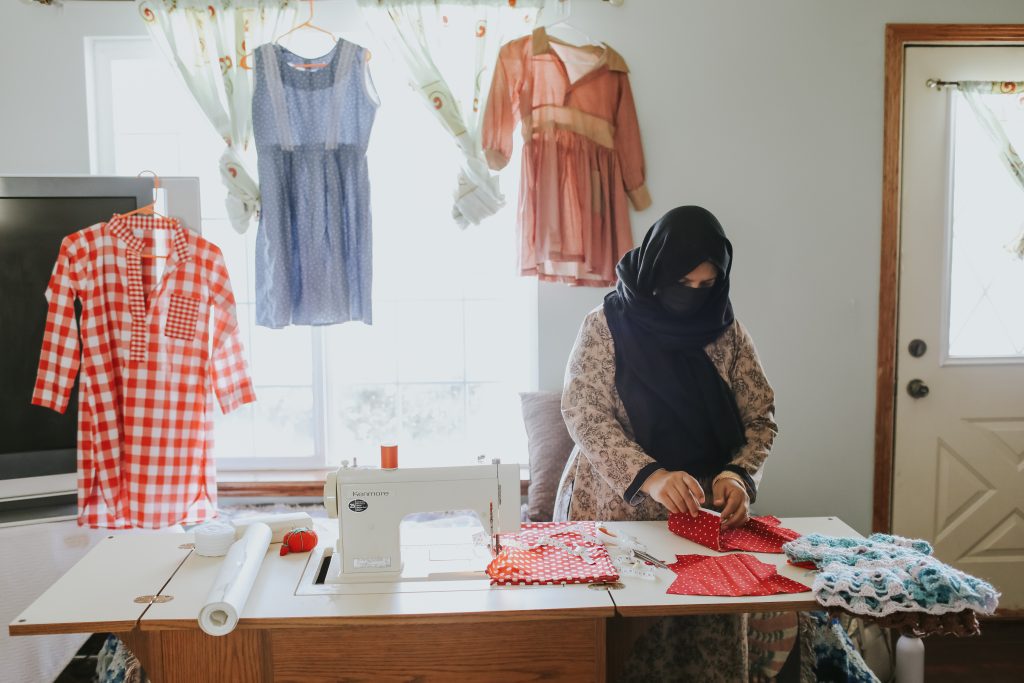
In Afghanistan
In her home community in Afghanistan, Samira* was a gifted seamstress. With her skills in sewing and crocheting, she crafted gorgeous wedding gowns, dresses, and other apparel.
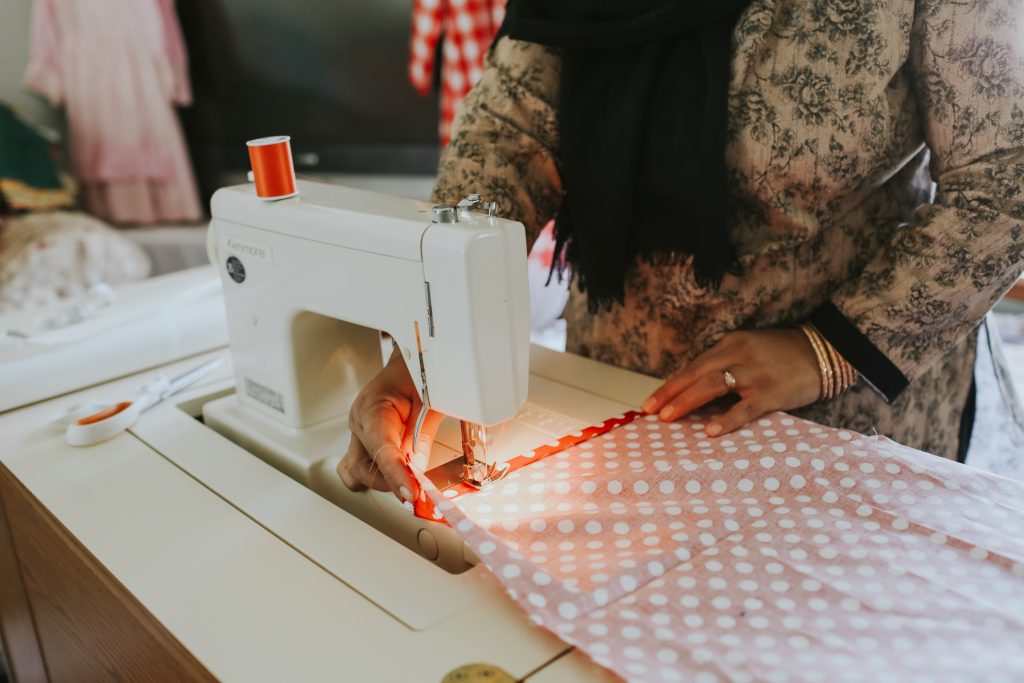
The days of making wedding dresses for friends and relatives in her hometown in Afghanistan are long gone. Today, they are documented only through a few photo prints.
On the Journey
Samira carried those photos with her when the family Afghanistan. They came with her to the U.S. military base where her family awaited resettlement. And now, in their new home in the suburbs of Chicago, Samira looks at her photos as mementos of a life left behind.
But even on their family’s journey, Samira found ways to use her talent and scarce resources to meet her family’s needs. She transformed a bedsheet into a dress for her daughter. She made yarn by hand from spare materials.
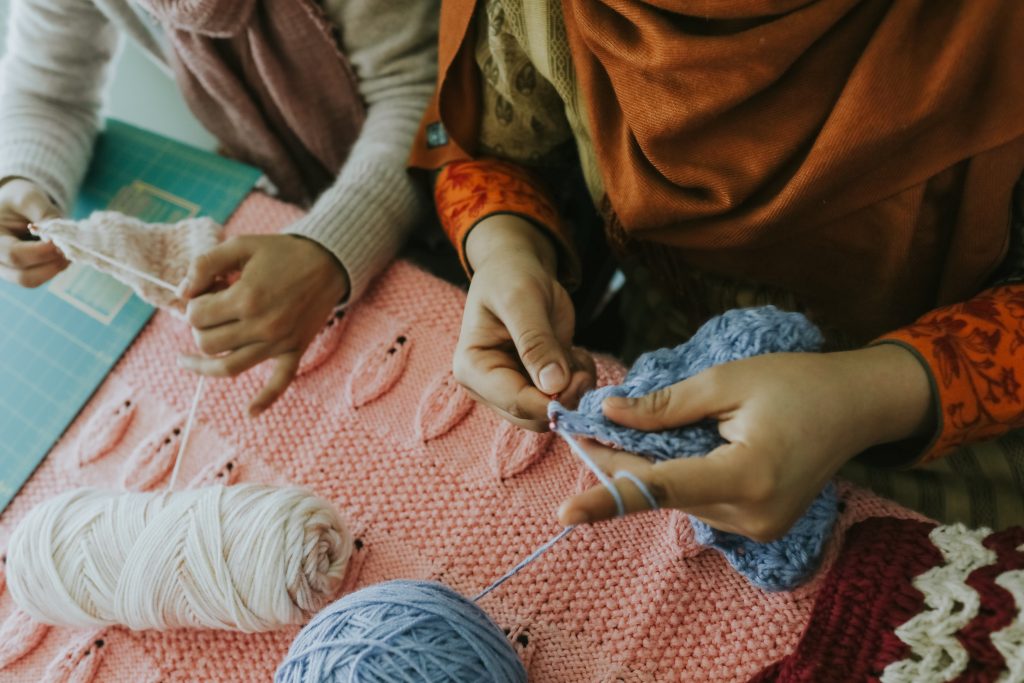
In a New Community
When World Relief Chicagoland welcomed Samira and her family to Illinois, staff learned of Samira’s skill as a seamstress. Thanks to the generosity of our supporters, she gained a sewing machine, fabric, thread, and other sewing tools. Now, she uses her skills to create a home and support her family in the United States.
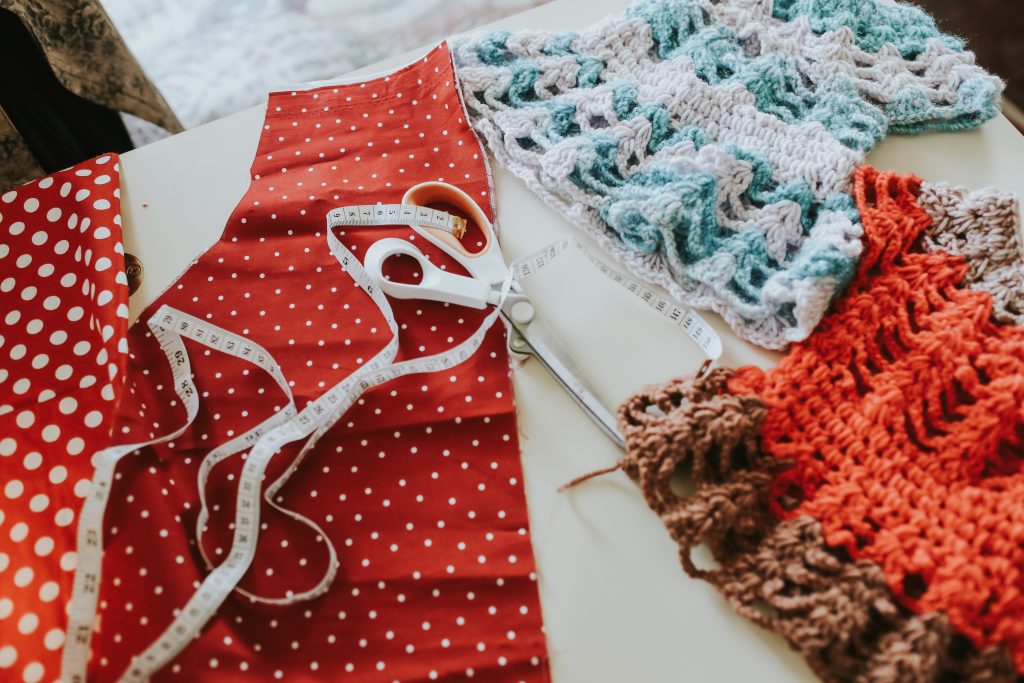
The next time World Relief Chicagoland staff saw her, Samira and her daughters were wearing brand-new dresses sewn just that week!
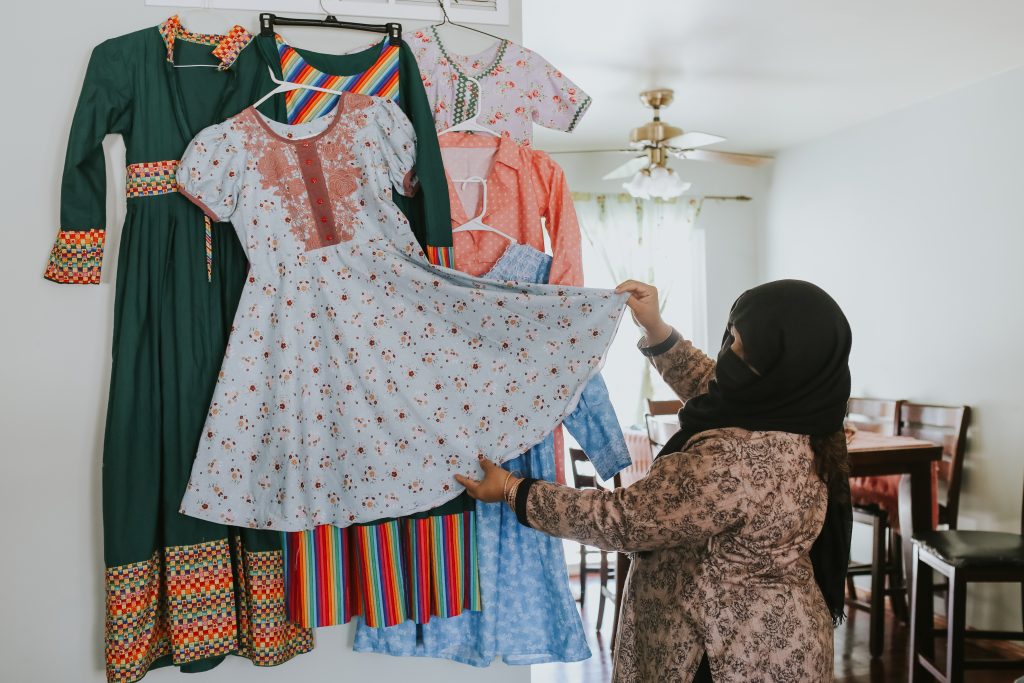
In her home, during cold Chicago winter, Samira crochets scarves, gloves, and hats. She and her daughters sew dresses. And while Samira left so much behind, now she creates beauty in her new community.
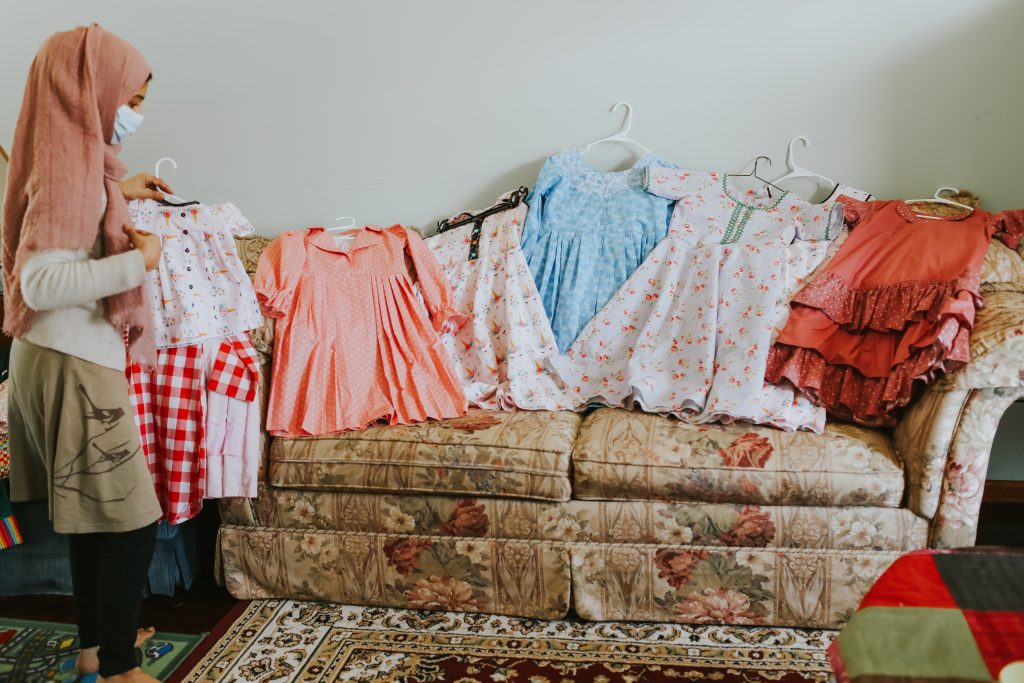
Images in this photo essay by Roxanne Engstrom of Hawa Images.
Read More
World Relief Chicagoland’s 2021 Year in Review is an annual report that features Samira’s story along with other stories of hope.
Click here to read the Year in Review.
As you read, we hope that reflecting on the year behind us inspires you. And that it reminds you of the power of creating welcoming community together.
The Memphis Quilting Bee
Last year, we introduced you to Mary, one of our World Relief Memphis volunteers. She’s been actively involved in our Youth Mentoring Program, and, she’s spearheading our Resiliency Program, which empowers women by teaching them the hard and soft skills necessary to find a job through sewing.
When World Relief Memphis first launched their Resiliency program, Mary was living in rural Kentucky. Originally from Memphis, she knew the World Relief staff member in charge of the program, and, as a fan of textile arts, she wished she could get involved right away.
“I began learning textile arts, like needlepoint and embroidery, from family as a very young child,” she said. “My dream was to be involved with a weaving studio or quilting bee, where I could make textile products with ladies from other cultures.”
With the distance, however, she knew her dream would have to wait. Instead, she would do her best to share about the program and get others involved.
“I was texting a bunch of people in Memphis saying, ‘If I was there, I would get involved. Research it, look into it, please get involved,’” she told her friends and family. “’This is a good thing.’”
A year later, Mary was back in Memphis, but the COVID-19 pandemic meant that her dreams of “chatting and laughing with other women while being surrounded by soft fabric and beautiful colors” would have to wait once again.
In the meantime, she began volunteering as a Youth Mentor, helping a recent high school graduate prepare for college. It did not involve sewing, but it did allow her to get a glimpse of the diverse community that calls Memphis home.
“I’ve always been fascinated by travel and other cultures; I enjoy exciting food and getting to visit other places, and so, being able to build a relationship with people who are different from me in my own city is really exciting,” she explained.
When WRM announced that they needed a volunteer to help with the Resiliency program in July then, Mary knew that it was the right time. It wasn’t a quilting bee overseas as she had originally imagined, but it was close.
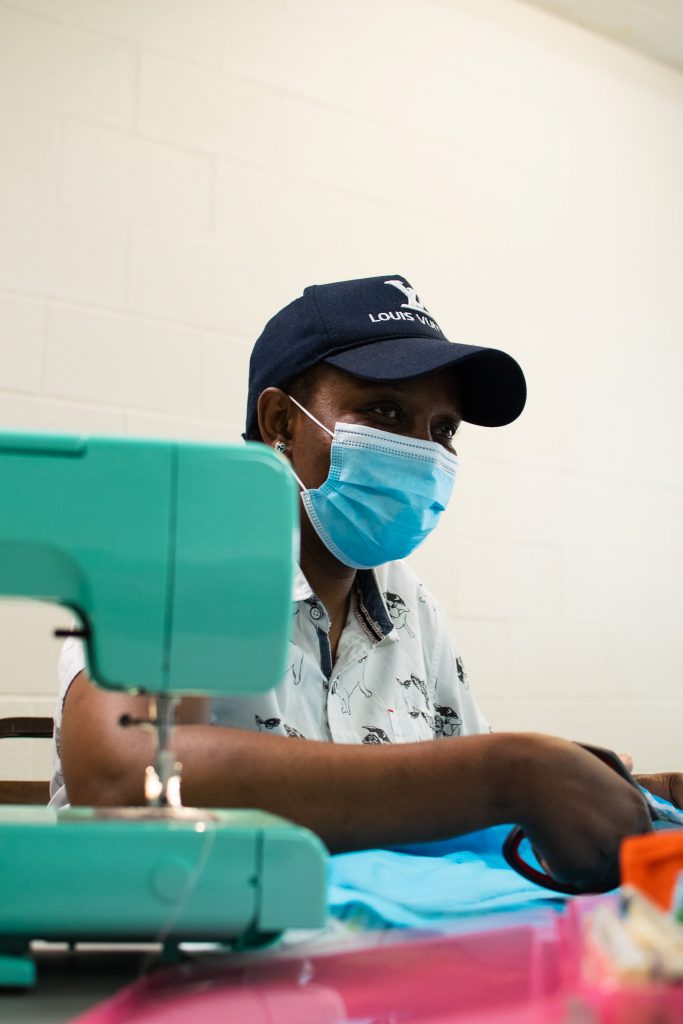
“Now, I am back in a city I left, in a country I tried to leave. I am using the skills God gave me to do what I love!” said Mary, who works full-time as well. “I am getting to be friends with ladies from many different countries! I would not have met these ladies if I had moved to one of their countries of origin.”
Each Saturday, they meet to discuss their sewing projects from the week before. If a student needs help, Mary shows them the next steps, encouraging them throughout the process. At the same time, the women are able to practice their English and prepare for a future career.
“If I could encourage women, that would make it all worth it,” she said. “Even if it’s just like ‘Wow, you did really good,’ by sewing a string or ‘Look at that button you sewed on by yourself. I’m really proud of you. You learned something in another language that is not your natural language. That’s great!’”
Already, Mary can see the progress that her students have made in just the few short weeks they’ve been working together.
Mary, thank you for donating your time and talents to help our neighbors in Memphis! If you want to do the same, join us as a volunteer—whether it’s youth mentoring, practicing English or helping a family. There’s plenty of ways to get involved, and we would love to have you come alongside us as we seek to serve our neighbors.
Video: We Believe the Church Can Change the World
Why the Church Has Hope for a Hurting World
At World Relief, we believe that when the Church is mobilized to achieve its full potential, it has the power to change our world.
This is because we believe that the local church is God’s plan to reveal his mercy, compassion and truth to people around the world. In each of our communities, local churches function as a social network. Churches have influence. Churches have the opportunity to share truths about God’s love, compassion, and justice.
And with the power of the Holy Spirit, we believe that the Church can accomplish more than humans could ever possibly do alone.
What is the task of the church? We are to embody Jesus Christ by doing what He did and what He continues to do through us: declare—using both words and deeds—that Jesus is the King of kings and Lord of lords who is bringing in a kingdom of righteousness, justice, and peace.
Steve Corbett, When Helping Hurts: How to Alleviate Poverty without Hurting the Poor and Yourself
How World Relief Equips the Church
World Relief Chicagoland has partnered with churches for more than 40 years. And the global World Relief network has partnered with churches across the U.S. and around the world for over 75 years. Together, thousands of church partners are creating long-term change in vulnerable communities. Today, we’re a movement of over 5,000 churches, across 20 countries, sharing hope and love to families in vulnerable situations.
World Relief believes the Church can change the world. Do you?
Watch the video below to hear more about our vision for churches.
Watch more videos of hope on World Relief Chicagoland’s YouTube channel or learn about how your church can partner with us to create lasting change.
More like this:
New Opportunity in the U.S.: Jenny’s Story
I Was No Longer Safe in My Country: Yomardy’s Story of Seeking Asylum
Community Partner Highlight: How a High-Schooler Mobilized Her Church to Donate 1,600 Pounds of Food
When assigned a year-long research project for her senior year of high school, Kamree Anderson knew exactly what topic to choose. What she didn’t know is that she would use this project to inspire long-term change.
Where It All Began
Senior Kamree knew for the subject of her final, ~15-page paper, she would have to choose a subject that was relevant to her community and involved her passions. “I’m super passionate about dietetics, nutrition, and generally how food works within the body,” Kamree says. “I knew the topic had to be on an issue in the community, though. I’d need to find a population in the area that this topic applies to.” With some further preliminary research, Kamree came to learn that the crisis level of malnutrition in refugees internationally stays high. She began to reach out to organizations locally that worked with refugees at that point.
The challenge lay in finding other organizations that are able to take food donations. It was her mom, Starr Anderson, who had recently worked with World Relief Triad, that suggested they call to find out if organizing a food drive to donate to the office would be possible. “I had contacted World Relief in the fall to find out what needs we could assist with,” Starr says. “ I put together a group of families from our congregation that could help with organizing the warehouse one Saturday in January of this year. At the same time, Kamree was working on her senior project.”
Kamree knew that the items would need to be specific in order to meet the needs of different diets based on culture, nationality, and religion, so after receiving a list from the office, she got to work.
Engaging the Community
From there, it was up to the high schooler to create excitement, involvement, and engagement. She decided to mobilize the congregation of her church, The Church of Jesus Christ of Latter Day Saints, in a church-wide food drive. She specifically chose to focus on her peers in her youth group.
“As part of the drive at my church, I made it a competition between different ages in the group to create excitement,” Kamree says. “Whoever brought the most food got to pie some of their friends in the face.” Her parents laugh at the “prize” for this project. They’re also quick to point out the impact of the illustration that their daughter used to also educate her peers through. This activity served as a way to visually represent the privilege that the U.S. possesses.
“I think in the U.S., we don’t always realize how blessed we are with resources,” Kamree says. By taping off certain-sized squares on the ground of where her youth group gathers, she showed the vast difference of square footage per household in other countries. “I was inspired to do the activity by a former teacher in middle school who did something similar. I remembered how much it impacted me.” After dividing the students up into each square based on room per capita, she also gave out a certain amount of cookies to each country to represent the amount of food that each country receives to really demonstrate the crisis.
When asked what was the largest takeaway from the process, Kamree speaks on the impact of being able to share her research with peers as a point of interest. “Personally, I knew a lot about dietetics before. But going through this project and specifically researching how it affects refugees and explaining it to my peers sparked a lot of interest in me,” she says.
“I want to keep helping people learn about it. Now, I also want to work in a refugee crisis center or something similar when I’m older.”
Setting an Example Across Generations
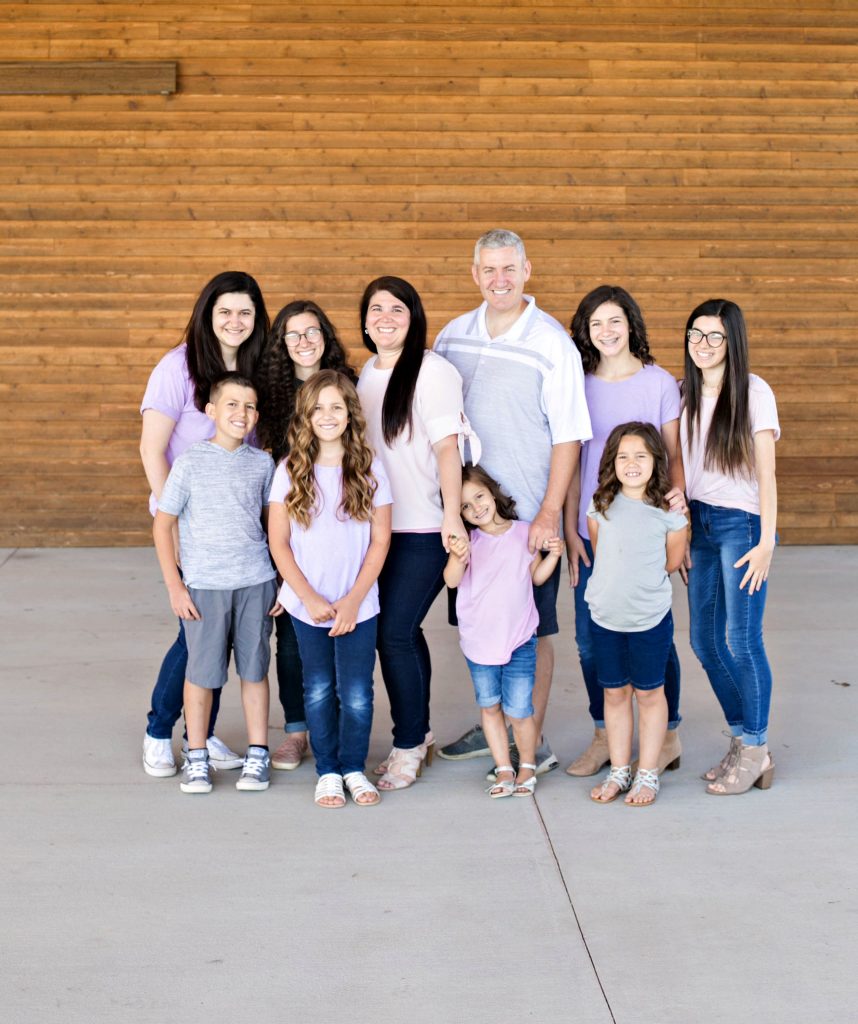
Her parents are still amazed by her leadership. “She ran this through our entire congregation and even into our neighborhood,” her mom says. “We’ve received continual comments about how amazing it is that Kamree is the one spearheading this effort. We’re grateful that she got the opportunity to do this.” Her father, Robb, is excited by the potential that he thinks younger people show. “We can’t underestimate them and what they can do,” he says.
Their church congregation is already asking if this is going to be an ongoing yearly effort. Kamree encourages them and the rest of her community, including her younger siblings who wanted to help, to remember that every little bit counts. When reflecting upon the response of her church, she states that “that’s how it’s supposed to be.” She knows that when we come together and ask partnering agencies and nonprofits what we can do instead of waiting, real change can occur.
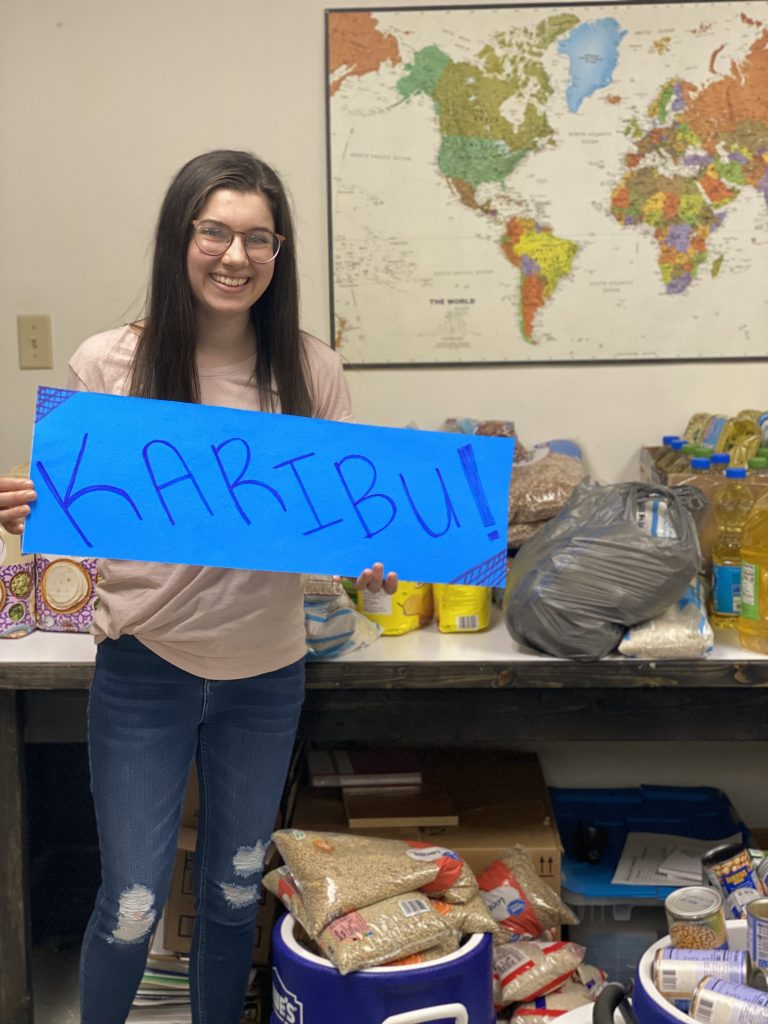
Growing with Gratitude
A word of reflection by Executive Director of World Relief Triad, Rob Cassell.
As we begin 2022, two main themes have been constant for the past few months going into the new year. They are gratitude and growth.
Gratitude
Both World Relief and our clients have felt incredibly loved by our community. As we welcomed Afghan families with a much-reduced timeline to prepare for their arrival, the community sprang into action. They arrived amid challenges regarding document, support delays, and housing difficulties. Good Neighbor Teams were quickly formed to welcome them and provide support, even as Congress lagged in this area. They helped ensured that these families would have their best chance to re-establish themselves here in the Triad. Others gave large one-time gifts solely dedicated to this population. Church members all the way from Boone, NC, began to contact us to see in what ways they could help become a community of welcome.
As we face the reestablishment of Winston-Salem as an official resettlement site and a ten-fold increase in arrivals, our community has already formed 10 Good Neighbor Teams to welcome them, along with several other groups forming Home Setup Teams to make sure that our newest neighbor’s homes are furnished and decorated to welcome our families.
We have also seen the business community of the Triad partner with us at unprecedented levels – both reaching out to partner with us in employing our clients and becoming what is known as a “Business of Welcome.” Businesses of Welcome partner with World Relief financially to create a community where all can thrive.
Growth
The theme of this year could easily be described as having a lot of growth as well: both growth in size and growth in service. We have many positions open to accommodate the increased number of clients we are seeing, with a lot of time and energy into training and empowering new staff to serve our community. Because of this growth, we are excited about providing more profound and more holistic service to our clients.
Some highlights to look forward to this year:
- The expansion of our Youth Mentoring program to Winston-Salem.
- A greater development of our Community Garden to include more agricultural and nutritional educational opportunities
- An increased focus and development of the Guilford Minor Trafficking Response Team – bringing together multiple community partners to combat the trafficking of minors as well as the new staff and capacity to serve the immigration legal services needs of the area.
We are excited by this growth and appreciate your partnership as we make the Triad a welcoming community together.
Grace and peace,
Rob Cassell
